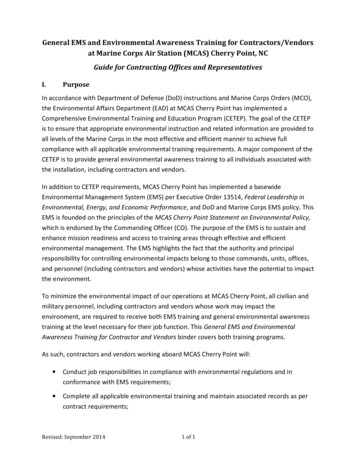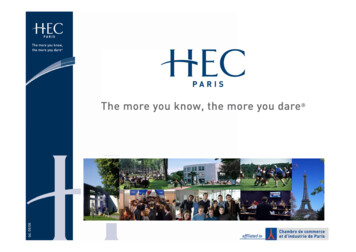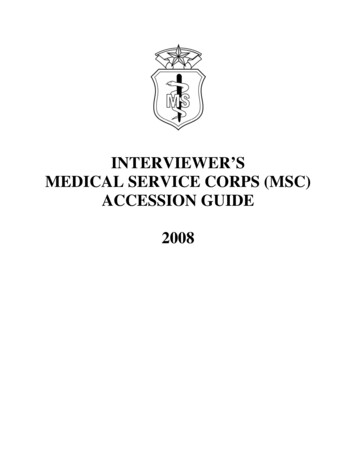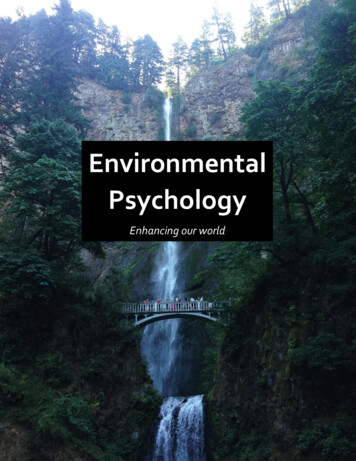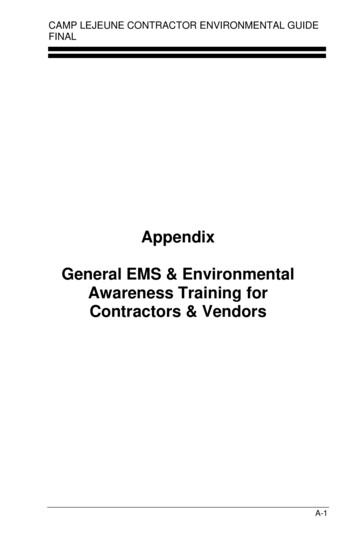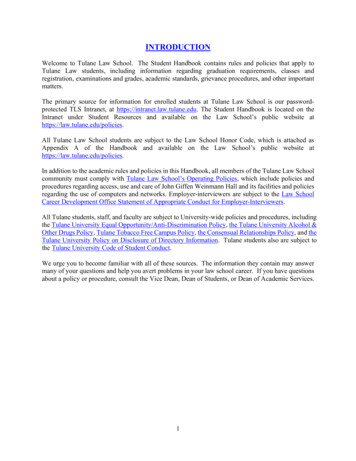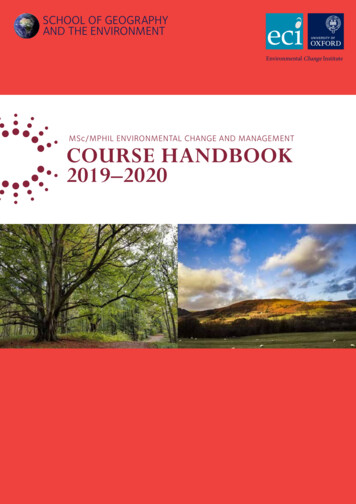
Transcription
SCHOOL OF GEOGR APHYAND THE ENVIRONMENTeciEnvironmental Change InstituteMSc/MPHIL ENVIRONMENTAL CHANGE AND MANAGEMENTCOURSE HANDBOOK2019–2020
This handbook applies to students starting the MSc (by coursework) in Environmental Change andManagement in Michaelmas Term 2019. Most of the information applies also to those commencing theMPhil version of the course, although where different, the information in the separate MPhil handbook takespriority. The information in this handbook may be different for students starting in other years.The Examination Regulations relating to this course are available at http://www.admin.ox.ac.uk/examregs/If there is a conflict between information in this handbook and the Examination Regulations then you shouldfollow the Examination Regulations.If you have any concerns please contact Dr Lorraine Wild (Academic erThe information in this handbook is accurate as at1st October 2019, however it may be necessaryfor changes to be made in certain circumstances, asexplained at www.graduate.ox.ac.uk/coursechanges.If such changes are made the department willpublish a new version of this handbook togetherwith a list of the changes and students will beinformed.MSc (by coursework) in Environmental Change and Management2019: version 1.0For the latest version of this handbook please see https://www.eci.ox.ac.uk/msc/course-info.htmlPhoto credits: Front cover, Kevin Soubly; back cover, Pek Shi Bao
WELCOME TO THE SCHOOL OF GEOGRAPHY AND THE ENVIRONMENTI am delighted to welcome you to the School of Geography and the Environment. The Schoolconsists of the Department of Geography and three associated research centres: theEnvironmental Change Institute, the Transport Studies Unit and the Smith School ofEnterprise and the Environment. Together, we are a unique hub in Oxford University forteaching and research on the interactions between people and environments. We aim toprovide our undergraduates, MSc, MPhil and DPhil students with the combination of socialand natural science skills to engage effectively with the big challenges of the twenty-firstcentury: from environmental change to globalisation; from philosophies of nature andsociety to biodiversity conservation; and from the frontiers of environmental science to thehard realities of public policy and corporate decision-making. The world-class quality of our research was recognisedyet again in the latest national assessment exercise (REF 2014), and it underpins our teaching excellence. We believethat our learning environment will further hone your analytical and communication skills – with lifelong benefits toyou and the contributions you will make to the wider world.I hope that you will be very happy in the University of Oxford. I hope that you will flourish academically andpersonally. Within the School, I trust that you will become active participants and become engaged with the manyevents and activities that we host. The collegiate University also offers a diverse and enriching series of opportunitiesto learn new skills, and I encourage you to make the most of what is on offer. And when you graduate, I very muchhope you will become an active member of our global alumni community.Gillian RoseProfessor of Human GeographyHead, School of Geography and the Environment AND TO THE INTERNATIONAL GRADUATE SCHOOLAs the Director of Graduate Studies (Taught Programmes), I am delighted to welcome you tothe School of Geography and the Environment’s International Graduate School (IGS).The School is an intellectually demanding but supportive environment in which to study. Weemphasise both independent and collaborative styles of working, providing a wealth ofopportunities to engage in an energetic research and teaching culture through classdiscussions, seminars, reading groups, field work and many other academic and social events.Gaining entry to our taught programmes is highly competitive and we therefore have greatconfidence that each of you brings something special to the cohort you are joining. I am sureyou will be looking forward to getting to know your new classmates within the IGS and to tackling new challengesand new ideas.Dr Jamie LorimerAssociate Professor,Director of Graduates Studies (Taught Programmes)MSc/MPhil ECM Course Handbook 2019–201
AND TO THE ENVIRONMENTAL CHANGE INSTITUTEThe Environmental Change Institute (ECI) is Oxford University’s interdisciplinary researchinstitute on the complex nature, causes and impacts of global environmental change. Morethan 75 researchers from a very diverse range of backgrounds and at least the same numberof students work on understanding the processes behind the changes we observe and exploreand promote sustainable responses to achieve change for the. The ECI has 28 years ofexperience in building partnerships with researchers, governments, business, media andcommunities to understand and respond to the risks and opportunities of environmentalchange. We do this through classical research, thinking and studying, measuring, analysing,and modelling; and creative ways of thinking using art, new media and old, and talking and listening to people fromall walks of life that need to make decisions in a changing environment. Engaging seriously with the challengeconfronted by decision-makers is requires constant scrutiny of our approaches and innovation in our research,education and engagement.As acting Director of the ECI, but also as a former student at a very different place, I would like to welcome you here,and promise that your time with us will be fully utilised both in your own studies, but also in creating long lastinglinks with the many and varied researchers in the ECI and Oxford University. The Environmental Change andManagement MSc course is a centrepiece in the ECI’s mission. We have designed the course to reflect our everchanging understanding of the processes that are shaping the planet and the opportunities for responding to them.This is sometimes difficult and sometimes even boring but more often exciting and a lot of fun. Our aim is to get youto learn about the issues but also to contribute to their resolution. This is a tough assignment.Dr Fredi Otto,Associate Professor, Climate Research ProgrammeDeputy Acting Director of the Environmental Change Institute AND FINALLY, TO THE MSC/MPHIL IN ENVIRONMENTAL CHANGE ANDMANAGEMENTIt is a great pleasure and privilege to welcome you to the ECM MSc/MPhil programme. Thiscourse focuses on the complex interactions between environmental change and humansociety. These provide some of the most intellectually stimulating and important challengesof contemporary times. As Course Director, I am very much looking forward to journeyingwith you on this intense but remarkable one-year MSc. One of the most exciting things aboutbeing at the ECI is the opportunity to engage with the wonderful, creative mix of researchers,practitioners and students who come together to work on critical ECM themes, includingclimate change, energy, food, water, and ecosystems. With such a dynamic, transdisciplinarycombination of international expertise and experience, creative new synergies are bound to form. Through the ECMcourse, and the extraordinary array of extracurricular opportunities available, students inevitably help to catalyseMSc/MPhil ECM Course Handbook 2019–202
these synergies, and are therefore a critical part of the ECI’s vitality and success. The teaching team consistentlyremarks upon how much they enjoy the mutual learning that goes on through group and one-on-one interactionswith students. I encourage you to immediately start engaging with your fellow students, the team and the wealth ofresources and opportunities available within and beyond the School of Geography and the Environment. This willfurther your learning and deepen your engagement with the challenges and opportunities that environmentalchange provides, this year and in the future.Dr Mark HironsCourse Director, Research FellowWelcome to the Environmental Change and Management Masters Programme, and to what Iwill guarantee will be one of the most stimulating, challenging and memorable years of yourlife. Throughout this year you will explore the challenge of understanding and tacklingenvironmental change in multiple aspects, at scales from local to planetary, and from a rangeof perspectives. As a cohort you bring a wide range of backgrounds and experiences: one ofthe real pleasures of this course will be how much we all learn together as the year proceeds.Both in this course and in Oxford as a whole you will be exposed to a wide range ofopportunities to listen, learn, engage and discuss some of the most important and urgentissues of our time. Make the most of these opportunities, but also enjoy the friendships, connections and memoriesthe year will bring. We look forward to working with you as you embark on the journey and adventure of the yearahead.Professor Yadvinder MalhiAcademic Director, Professor of Ecosystem ScienceMSc/MPhil ECM Course Handbook 2019–203
CONTENTS1. INTRODUCTION . 61.1. Course Introduction . 61.2. School of Geography and the Environment. 61.3. Transfer from MSc to MPhil . 71.4. The Environmental Change Institute . 71.5. Oxford Learning Environment. 82. COURSE INFORMATION . 122.1. Aims/Objectives . 122.2. The Study Programme . 132.3. Course overview by term . 173. ASSESSMENT . 193.1. University Examinations . 193.2. The Exam Board . 193.3. Role of Colleges and Proctors . 193.4. Feedback on Learning and Assessment . 203.5. Monitoring Academic Progress. 203.6. Examinations Conventions. 204. ASSESSMENT COMPONENTS . 214.1. Written examinations . 214.2. Elective modules . 224.3. Dissertation . 224.4. Submission deadlines. 234.5. Good Academic Practice and Avoiding Plagiarism . 234.6. Course Governance and Student Representation . 234.7. Complaints and Academic Appeals . 244.8. Key Departmental Contacts . 254.9. Key Dates . 25MSc/MPhil ECM Course Handbook 2019–204
5. COURSE MODULES . 265.1 Understanding Environmental Change . 265.2 Responding to Environmental Change . 565.3 Methods and Techniques in Environmental Change . 806. RESIDENTIAL FIELD COURSES . 877. GENERAL INFORMATION . 887.1. Printing . 887.2. ECI Library Resources . 887.3. The House Rules . 887.4. Health and Safety, and Ethics . 887.5. Parking . 897.6. Out of Hours Access . 897.7. Risk Assessment For Fieldwork . 897.8. Personal Development. 898. DISSERTATION PROCEDURE: REGULATIONS AND GUIDELINES . 908.1. Timetable . 908.2 Presentation . 908.3. Referencing . 918.4. Important Information – Plagiarism . 918.5. The Assessment of the Dissertation . 928.6. Selecting a topic . 928.7. Dissertation supervision advice . 938.8. Viva information . 93Appendix 1: Core teaching staff . 94Appendix 2: MSc and MPhil Induction. 98Appendix 3: IMPORTANT DATES 2018 – 2019 . 99MSc/MPhil ECM Course Handbook 2019–205
1. INTRODUCTION1.1. Course IntroductionThis handbook provides an overview of the MSc in Environmental Change and Management (ECM). The MSc in ECMalso serves as the first year (and qualifying examination) of the two-year MPhil in Environmental Change andManagement. MPhil students should also refer to the handbook for the MPhil course for the details of the MPhilexamination conventions and the year two research thesis.This handbook sets out the aims of the course, the content of the study programme and the various componentparts of the course, including: lectures, electives, skills workshops, field trips, examinations, and dissertations. Thehandbook contains important information about submitting coursework, guidelines for dissertations and attendingexaminations. Please read through the booklet carefully and ensure that you understand your obligationsthroughout the course. We will provide you with more detailed material for particular parts of the coursethroughout the year.1.2. School of Geography and the EnvironmentThe School of Geography and the Environment (SoGE) and its associated research institutes, based in the OxfordUniversity Centre for the Environment (OUCE), are internationally recognised for their excellence in environmentalresearch and scholarship. The historical origins of OUCE lie in the former School of Geography, the first geographyschool to be established in the UK, over 100 years ago by Halford Mackinder. The School was established through aco-operative effort involving the Royal Geographical Society and Oxford University. From these deep roots theSchool has grown and prospered. The ethos of the School of Geography and the Environment is to promote researchthat is bold, innovative and challenging whilst remaining committed to the highest standards of scholarship.Today, the School of Geography and the Environment (SoGE) is one of the leading centres of scholarship forenvironmental and social change. The SoGE is committed to training a new generation of graduate students in thecore research fields of environmental science and human geography and in the new and exciting interdisciplinaryresearch frontiers that exist between and across these disciplines.The School of Geography and the Environment is home to the internationally recognised Environmental ChangeInstitute (ECI) and other vibrant research centres, such as the Oxford Water Network (OWN) and the Oxford Centrefor Tropical Forests (OCTF). In January 2013, the Smith School of Enterprise and the Environment became a researchcentre within the School of Geography and Environment. Creative combination of theory and practice provides arelevant and fertile training ground for our postgraduates. Our research programmes span the globe withresearchers working in Africa, Asia, the Caribbean, South America, and North America along with a strong record inEuropean studies and, of course, the UK.The SoGE currently offers five thesis-based higher research degrees (DPhil and four MPhil courses) and four MSccourses. The DPhil requires a separate application of admission which is contingent on outstanding performance inthe MSc (see the SoGE website for additional details and attend the Michaelmas Term information session).Conversion to the MPhil requires an application of transfer, which is described in detail below. The four SoGEMSc/MPhil ECM Course Handbook 2019–206
Masters of Science courses are:MSc Biodiversity, Conservation and ManagementMSc Environmental Change and ManagementMSc Nature, Society and Environmental GovernanceMSc Water Science, Policy and ManagementThe four MPhil courses are two-year version of these programmes aimed at students who wish to have a substantialresearch component to their studies. In the first year, candidates take the coursework and examinations associatedwith one of the four MSc courses in the School of Geography and the Environment and in the second year, studentsdevote most of their time to researching and writing a thesis of 30,000 words.1.3. Transfer from MSc to MPhilDuring the MSc course some students decide that they would like to extend their studies by transferring to the 2year MPhil programme. In the first instance you should discuss the possibility of transferring with your CourseDirector. The deadline for making an application to transfer to the MPhil is Friday week 1 of Trinity Term.Applications should be submitted to Ruth Saxton, Research Degrees Coordinator (research-degreescoordinator@ouce.ox.ac.uk). The application should include: an email of support from the agreed supervisor of your MPhil thesis (sent directly to Ruth Saxton by thedeadline) a completed Change of Programme of Study form (GSO.28) signed by and approved by both your college andproposed dissertation supervisor. an MPhil dissertation proposal (to a maximum of 1000 words) outlining the context, aims, methods, andtimetable of your proposed research.All applications will be reviewed by a panel Chaired by the DGS (Taught Programmes) in early Trinity Term.Applications will be assessed on the basis of the academic performance of the applicant, the dissertation proposal,and any resource requirements from the School (including staffing and supervision resources). Applications willnormally only be considered from students who have achieved at least 60% in their assessed essays from the twoelectives. Students will not be permitted to transfer to the MPhil if they do not pass all of their MSc examinations.Final decisions on applications to transfer to the MPhil will only be confirmed after the meeting of the MPhil(Qualifying Examination) board in early July. The department retains the right to refuse a transfer. You should alsonote that your college will ask for evidence that you have the financial means to cover the fees and living expensesof the additional year of study.1.4. The Environmental Change InstituteWithin the School, the Environmental Change Institute is the largest entity with more than 90 researchers, 300partners, and approximately 70 postgraduate students in the ECM MSc, MPhil, and DPhil programmes. The ECI is aMSc/MPhil ECM Course Handbook 2019–207
hub for environmental research, policy solutions and outreach and helps to anchor the five Oxford Networks for theEnvironment (ONE): biodiversity, climate, energy, food, and water.An interdisciplinary institute that undertakes research on pressing environmental issues, the ECI organises this MSc,and fosters university-wide networks and outreach on the environment. It is a major centre for environmentalactivities at the University. The ECI was founded in 1991, through benefactions, and designed to answer questionsabout how and why the environment is changing and how we can respond through public policy, private enterprise,and social initiatives. The ECI’s interdisciplinary approach, bringing together natural and social scientists andengineers, is inspired by the needs of decision-makers who are striving to respond to global environmental change.The Institute is currently organised around three major research themes – climate change, energy and lower carbonfutures, and ecosystem science and conservation - with close links to the School of Geography of Environmentresearch clusters (https://www.geog.ox.ac.uk/research), as well as the Smith School for Enterprise and theEnvironment, the Martin School, and the Saïd Business School (see 1 1 MBA plus1/Pages/default.aspxMost ECI staff are full time research scientists working on specific externally funded projects within the Institute’sresearch themes, although we also host a number of research fellows working more independently on cross-cuttingissues, as well as a wide range of Honorary Research Associates (HRAs). Many of the research projects have a goal ofinfluencing and informing public policy and decisions about the environment. We encourage you to engage with ECIstaff, many of whom teach on the course and their specific research programmes. For more information on the ECIsee www.eci.ox.ac.uk.This inter-disciplinary course is led by academics in SoGE and other departments from anthropology to zoology, andsupported by experienced practitioners, all of whom have considerable national and international expertise. Thecore staff teaching on the course are listed in the appendix and more detailed personal profiles are available at:http://www.eci.ox.ac.uk/people/. Their specific roles on the course are described below.The ECI hosts a special welcome event for new students during the first weeks of Michaelmas Term.1.5. Oxford Learning Environment1.5.1. Learning ApproachDuring your time at Oxford you will experience a wide range of different formats and styles of teaching, from smallgroup discussions to field visits, from skills based workshops to presentations, and from traditional lectures to publictalks by some of the world’s leading academics. In keeping with Oxford’s tradition of academic freedom, the exactnature of the learning experience within any particular tutorial, seminar or lecture is left to the discretion of theinstructors which, we hope, produces a dramatic variety of learning experiences. Yet, the most typical forum forteaching and learning remains the lecture – although there is immense variation in how lectures are delivered and allinvolve opportunity for participation and discussion.In the International Graduate School, we place strong emphasis on peer group and individual learning. Your peergroup consists of exceptionally talented scholars from around the world (typically 13-20 different countries and 5-6MSc/MPhil ECM Course Handbook 2019–208
continents), many of whom have practical experience or extensive knowledge of issues and topics covered in theMSc course. We strongly recommend that you form strong academic bonds with your peers and we encourage thiswith small group projects, reading groups, workshops and discussions.There is an obligation on you as an individual to develop your own spheres of interest within the subject area and towork hard at identifying gaps in your knowledge and training. Oxford’s exceptional learning facilities provideunrivalled opportunities for individual learning, not to mention the array of international researchers and scholarswho present their work at external lectures around the university. We urge you to take full advantage of all of theseopportunities in order to get the most out of your time at Oxford.Staff members are available to advise students on reading, literature, methods, skills and topics. Staff membersinclude not only faculty who lecture, but also those who lead workshops, symposia, exercises, reading groups,methods surgeries and other special forums. Each core module is led by a team, including faculty members and acourse animator or teaching assistant. The course animator’s role is to help link module lectures and readings withpractical skills, and also to extend learning and reinforce key concepts through other modes of learning, such asreading groups, field courses, discussions, and debates. This year we are fortunate to have two graduate teachingassistants (TAs) for the course, Carley-Jane Stanton and Marcus Spiegel, who will provide additional support to theoverall teaching and learning environment and mission. Finally, an ECI Graduate Supervisor will be assigned to assistand oversee each student, and will endeavour to contact you regarding your progress at least once a term and torespond to your termly self-assessments on the GSR or Graduate Supervision Reporting. As well, your College willprovide a personal adviser who can give additional support.Students should note the University guidelines on graduate students undertaking paid -word-guidelines-graduate-students1.5.2. Feedback on Learning and AssessmentThroughout the year, there will be opportunities for informal and formative feedback on your learning andunderstanding through class discussions, peer feedback on presentations and interactions with course staff. You willreceive written and/or oral feedback on at least one piece of formative assessment for each elective and writtenfeedback on your two summative elective essays. This feedback will focus on identifying the good points of youressay and give suggestions on how to improve the quality of your written work. You will also receive writtenfeedback on your dissertation.1.5.3 If you need helpIf you find yourself facing a problem during your course of study you can seek advice and support from varioussources in the University. Generally, the department is best qualified to help you navigate problems relating to theacademic content of the course and your college is best qualified to provide support and advice relating to health orpersonal problems.Every college has their own systems of support for student
This handbook applies to students starting the MSc (by coursework) in Environmental Change and Management in Michaelmas Term 2019. Most of the information applies also to those commencing the MPhil version of the course, although where different, the information in the
